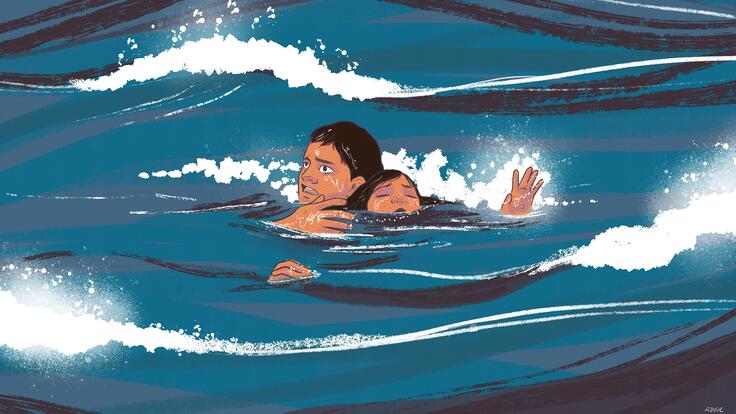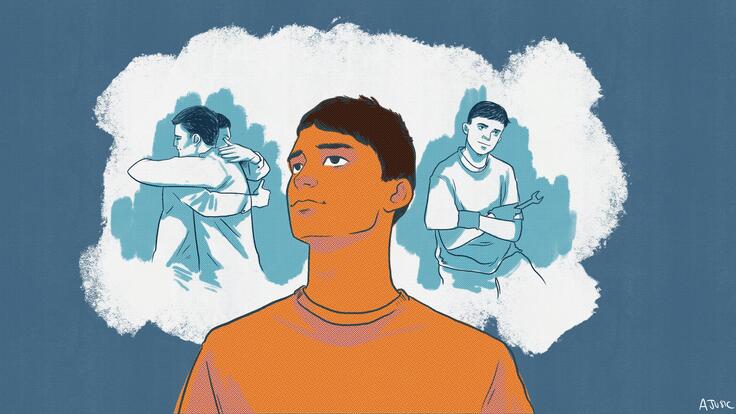An Afghan teenager's journey to safety
A 16-year-old Afghan boy in Greece hopes to be reunited with his family. Illustrator Ada Jusic brings Ali's story to life.
A 16-year-old Afghan boy in Greece hopes to be reunited with his family. Illustrator Ada Jusic brings Ali's story to life.
“Here, everything is difficult. For everyone, but especially refugee children like me, alone.”
When 16-year-old Ali* first arrived in Greece two years ago, he’d already been arrested multiple times for trying to cross European borders to join his older brother, who had invited him to come live with him in Germany.
While waiting for his reunification appeal to be answered, Ali moved into an apartment in Athens for unaccompanied, asylum-seeking children. The apartment building is run by the International Rescue Committee (IRC), which also provides social workers, legal assistance, psychological counseling, life skills classes, and other support to the young residents. There, Ali is spending time with other teenagers like himself, getting the care he needs, going to a local high school, and learning how to live independently.
Ali’s family were originally from Afghanistan, but he was born in Iran, where Afghan refugees and their children are often denied education, employment, health care, and even freedom of movement.
Refugees hoping to find safety from the violence in their home country are instead at risk of forced labor, forced deportation, and forced family separation. And they face maltreatment and physical abuse in Iran’s detention and deportation centers.
Like most Afghans living in Iran, Ali didn’t have identification documents—so he was unable to go to school. He started working to help his family when he was just nine years old.
“I was working 15-16 hours a day. I worked like this for five years. It was not fun.”
When Ali’s father died, his family was left with nothing. “For two or three months, my mother and I slept in a park,” he recalls. “That’s why I had to start working.”
For two or three months, my mother and I slept in a park. That’s why I had to start working.
Without documents, Ali had virtually no rights in Iran, so he had no option but to leave the country with his mother, his married sister and her family.
Unfortunately, while traveling from Iran to Turkey, Ali became separated from his mother, who was deported to Afghanistan.
Although just a young teenager, Ali was determined to reach his brother in Europe and make a new start. “I tried to get to Greece eight times across the Evros River. Every time the Greek police would catch me and deport me back to Turkey.”
Ali remembers one particularly precarious crossing attempt: “The boat sank, and we had to swim across the river. I know how to swim but my sister doesn’t, so I took her by the hand, and I started swimming.

“My sister was pulling me down. It was very difficult. It was like that for about an hour; I would sink, go under the water, and then come up again. The Turkish police stopped me and sent me back to Turkey.”
It took Ali and his sister four months until they eventually made it to Greece. But soon after they arrived, they were separated. His sister was taken to a camp for families with her husband and children, while Ali—because he was a minor who arrived without parents—stayed in Fylakio, a holding center for newly arrived migrants, where he remained for an entire year.
Ali had a rough time in Fylakio, and the memories still give him bad dreams today. “In the evening…[the social workers] go home, and the police are the only ones there.” he recalls. “When the children played football in our block, the police would come and beat us.”
The boat sank, and we had to swim across the river. I know how to swim but my sister doesn’t, so I took her by the hand, and I started swimming.
After Fylakio, Ali was moved to a hotel used for temporary accommodation for unaccompanied children. It was then he finally found a home at the independent living apartments run by the IRC in Athens. He's lived there since January and is glad to have someone looking out for him. “Everybody here is OK,” he says. “Everything I need, they help me.”
The only thing missing, he says, is his family.
“My sister has been here for two years, and I have barely seen her—only one time. I would love to have my family together one day: my mother, brother and sister. That would be really good.”

Since moving into the apartments, Ali has received the good news that he’s been accepted for family reunification with his brother in Cologne, Germany. “I am happy, and I want to cry at the same time!”
As he waits for the day of his departure, Ali is studying in school to improve his English and using an app on his phone to learn German. He also joins in outdoor activities and classes in cooking, budgeting, interpersonal communication and other life skills organized by the IRC staff. In his free time, he likes to explore Athens with his friends, and he navigates the city with confidence.
Ali is excited to be reunited with his brother and has big hopes for his future in Germany. “I want to be a car mechanic or motorcycle mechanic,” he says.
I would love to have my family together one day: my mother, brother and sister. That would be really good.
That reunion can’t come soon enough. Ali’s bad experiences with the police on his journey have made him anxious to leave Greece.
“I only have bad dreams here. I am afraid of the police. In Germany, I will not be afraid. I will have my brother with me.”
Update November 15, 2021: Ali has been reunited with his brother Mehdi in Germany. Read their story and watch the moment they are reunited after 11 years.
*Name has been changed to protect his identity
llustrations: www.adajusic.com/IRC
A version of this story was originally published by IRC-UK.